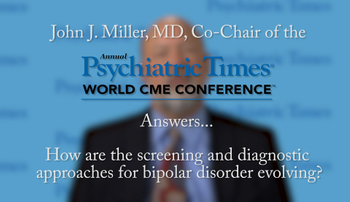
As we navigate uncharted waters on the pandemic front, John J. Miller, MD, shares his thought about this important topic and what he is doing differently both professionally and personally.

Dr Miller is Medical Director, Brain Health, Exeter, New Hampshire; Editor in Chief, Psychiatric Times; Voluntary Consulting Psychiatrist at Seacoast Mental Health Center, Exeter/Portsmouth, NH; Consulting Psychiatrist, Insight Meditation Society, Barre, Massachusetts.

As we navigate uncharted waters on the pandemic front, John J. Miller, MD, shares his thought about this important topic and what he is doing differently both professionally and personally.

Experts discuss the rationale and history of L-methylfolate use in patients, and then shares three cases that collectively suggest L-methylfolate may contribute to agitation and mania.

When we meet a new patient who presents with "classic" symptoms, there are challenges described in this brief video.

Editor in Chief John Miller, MD, shares his insights on the upcoming Psychiatric Times World CME Conference in October.

Here we are-beginning a new day and a new decade-and, once again, we are filled with excitement, hope, anxiety, and fear.

Medicine and psychology have integrated the basic principles of mindfulness into many diverse treatment modalities. Seven are listed here.

In our role as clinicians, we participate in the practice of medicine because there is always more to learn, and more experience to be gained. Such is the case with mindfulness...

Practicing mindfulness has become a foundational treatment in various mental health professions.

Practicing clinical medicine is challenging and stressful enough without the additional burden of being handcuffed by ever-changing medication formularies.

Most drugs, after journeying through the various metabolic systems throughout the body, find their exit.

The author reminds us of our responsibility to make each decision and choose each action wisely and thoughtfully in life.

Each moment of each day we make choices that can affect our brain health-our challenge is, without judgment, to increase the choices that promote a healthy brain.

An impressive and ever-expanding research literature exists on the topic of pharmacogenomics. Despite this, only four genes have been vetted as clinically actionable.

Psychiatry has finally crossed into a new paradigm in the treatment of TRD, bringing the glutamate system on board to join the modulation of the monoamine systems.

The controversial question of whether to legalize cannabis has emerged front and center as an important issue that deserves a serious and thoughtful dialogue.

We have come a long way in psychiatry, but we are still at the beginning of the story of understanding the human brain.

Substance use disorders are a common comorbidity in individuals with bipolar disorder. Adding cariprazine to their medication regimen may improve symptoms of both disorders.

Since the choice of treatments for a primary bipolar I disorder major depressive episode versus a unipolar major depressive episode are significantly different, this information will help guide clinicians in how to proceed.

The author explores the significant pharmacokinetic and pharmacodynamic heterogeneity of current antidepressants and reviews the many potential drug targets that exist-with a focus on the serotonin system.

This article focuses on the various classes of antidepressants and how they have evolved.

Tips for having a balanced and comprehensive risk-to-benefit discussion with competent patients who want to stop their medications.

This article reviews the reasons for measuring serum levels of psychotropics and provides optimum serum levels for various psychotropic agents to optimize their effectiveness and safety.

Most often, psychiatric medications are discontinued unilaterally by the patient, without the psychiatrist’s input or consent. Setting the stage early with a discussion about medication discontinuation is time well spent. More in this CME.

Borderline Intellectual Functioning is rarely included in clinical reports and case/treatment team reviews except indirectly when, as part of the mental status examination, mention is sometimes made that the patient’s intellect appears to fall below average limits.